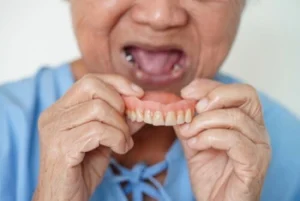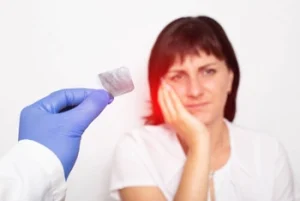Denture stomatitis may seem minor at first, but it often signals deeper issues that can affect long-term oral comfort. Understanding the causes behind this condition allows for targeted relief and better outcomes. Early treatment supports healing and restores comfort for those who wear dentures every day. Below, we cover everything you need to know about effective denture stomatitis treatment.
Recognising What Causes Denture Stomatitis
Denture stomatitis is an inflammatory condition where the tissue beneath a denture becomes red, swollen, or irritated. Let’s explore the common causes behind this irritation and what triggers them.
Poor Fit and Continuous Wear
Ill-fitting dentures can place unnecessary pressure on the soft lining inside the mouth (oral mucosa), which often leads to inflammation or tissue breakdown. When dentures shift or rub during eating or speaking, they irritate the underlying skin, creating small wounds or red patches. Wearing dentures around the clock without breaks restricts airflow and traps moisture. This creates an environment that encourages fungal overgrowth. New dentures should be checked regularly to ensure they maintain a stable fit over time.
 Hygiene Practices and Fungal Build-up
Hygiene Practices and Fungal Build-up
Poor denture hygiene allows debris and microbes to accumulate on the denture surface, especially overnight. When not cleaned properly, the denture fitting surface harbours Candida species, a type of yeast naturally present in the mouth that can overgrow and lead to fungal infections, along with other irritants that compromise oral health. Poor oral hygiene also plays a role, as plaque around the gums introduces more bacteria into the mix. These microbes promote inflammation and increase the risk of oral mucosal lesions, which appear as red patches, ulcers, or sore spots on the inner mouth surfaces. Regular cleaning helps reduce this microbial load.
Underlying Risk Factors That Make It Worse
Certain medical conditions and lifestyle factors heighten the chance of developing denture-induced stomatitis. Dry mouth, for instance, reduces saliva’s natural cleansing action, allowing yeast infections to thrive. Diabetes, medications, or immune suppression all contribute to vulnerability. Denture age also matters; older acrylic dentures are more porous, trapping more bacteria. Recognising these risk factors supports early intervention.
Diagnosis and Identification of Denture-Related Inflammation
Timely and accurate identification of denture-related stomatitis ensures you receive the right treatment without unnecessary delay. The following insights explore how this condition is diagnosed and confirmed.
Observing Symptoms in Daily Life
A sore mouth that doesn’t improve with basic care often prompts people to seek answers. Red patches, swelling, and sensitivity in areas covered by complete dentures can be key signs. Discomfort may vary in intensity but usually worsens with continued denture use. These changes often develop gradually, making them easy to overlook at first. Paying close attention to early symptoms supports faster action.
How Prosthetists Diagnose the Condition
Denture stomatitis diagnosed in a clinic involves a combination of visual examination and discussion. A prosthetist will assess both the denture surfaces and the condition of the mouth to check for redness, irritation, or signs of fungal infection. They may ask about cleaning routines, denture age, and recent changes in comfort. In some cases, further tests are ordered to check for Candida spp. Prompt diagnosis is key to reversing symptoms efficiently.
What Makes This Inflammation Unique
Denture-related stomatitis usually appears only in areas under the denture base. Unlike other oral health conditions, it doesn’t typically affect uncovered tissue. This pattern of inflammation helps distinguish it from broader infections or allergic reactions. The denture fitting surface often mirrors the affected tissue. This correlation makes clinical identification easier and more reliable.
Effective Strategies for Treating Denture Stomatitis
Once diagnosed, the treatment of denture stomatitis involves both short-term relief and long-term habits to prevent its return. Each strategy targets specific causes and supports tissue healing.
Cleaning and Restoring Denture Hygiene
Improving denture hygiene is the first step in reducing irritation and promoting healing. Denture wearers should clean their acrylic dentures daily using a non-abrasive cleanser and soak them in a disinfecting solution as recommended by the manufacturer. Removing them during sleep helps dry out the denture surface and lowers the microbial load. Daily care prevents plaque build-up and protects sensitive tissue from further inflammation. Over time, these changes reduce discomfort significantly.
Medicinal Treatments to Combat Fungal Growth
Antifungal medications are commonly prescribed when Candida overgrowth is involved. These may be delivered as rinses, gels, or tablets depending on severity and the patient’s preference. Treating yeast infections at the root helps restore a healthy balance in the oral cavity. The treatment of denture stomatitis with antifungal agents should always be combined with improved hygiene. Without both elements, recurrence remains likely.
 Professional Therapies That Support Healing
Professional Therapies That Support Healing
Laser therapy may be recommended as part of denture stomatitis treatment. This approach uses light energy to reduce inflammation and promote tissue repair without the use of drugs. Laser therapy is especially helpful in cases that do not respond to antifungal medications. Your prosthetist may also recommend adjustments or relining of poorly fitting dentures. In advanced cases, replacing the prosthesis entirely may be the most effective solution.
Preventing Recurrence and Supporting Oral Health
Embracing a Long-Term Care Routine
Good oral hygiene extends beyond brushing your dentures. Rinsing your mouth with water after meals, cleaning your gums gently, and attending regular check-ups help protect the oral environment. Removing dentures for at least 6 to 8 hours daily allows the tissues to recover. If a temporary denture is in use, special care must be taken to avoid extended wear. Maintaining a routine keeps inflammation at bay.
Knowing When to Replace or Adjust Dentures
Over time, bone loss in the jaw can lead to poorly fitting dentures that irritate the gums. This is common in long-term wearers and may require refitting or new dentures altogether. Clinics will often assess denture age and structural stability during routine appointments. Modern implant-retained dentures offer improved comfort and reduce the likelihood of pressure sores. A prosthetist will advise on the right time for replacement.
 Regular Visits to a Trusted Clinic Like Ours
Regular Visits to a Trusted Clinic Like Ours
Complete denture wearers benefit from consistent monitoring by a clinic like ours that understands their oral health needs. Adjustments, relines, or replacements can be timed appropriately to avoid unnecessary discomfort. Any new sore areas or signs of fungal overgrowth should be assessed promptly. Ongoing support helps patients wear dentures comfortably and with confidence. Establishing this connection early contributes to better long-term outcomes.
Get Relief from Denture Discomfort Today
Denture stomatitis does not have to disrupt your daily life. With the right treatment and proper care, the symptoms can be managed effectively and prevented from recurring. If you’ve noticed a sore mouth, red patches under your dentures, or signs of fungal irritation, speak with our team today. We’ll provide tailored care based on your unique needs and denture history. Please call us on (07) 5317 1023 or (07) 5315 8076 to schedule your visit to our clinic.
References
https://pmc.ncbi.nlm.nih.gov/articles/PMC11122031/
https://www.ijcmph.com/index.php/ijcmph/article/view/9330


 Hygiene Practices and Fungal Build-up
Hygiene Practices and Fungal Build-up Professional Therapies That Support Healing
Professional Therapies That Support Healing Regular Visits to a Trusted Clinic Like Ours
Regular Visits to a Trusted Clinic Like Ours


Recent Comments